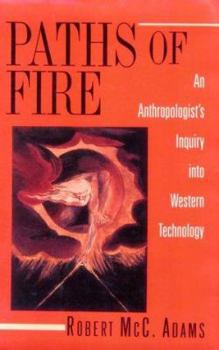Paths of Fire: An Anthropologist's Inquiry Into Western Technology
Technology, perhaps the most salient feature of our time, affects everything from jobs to international law yet ranks among the most unpredictable facets of human life. Here Robert McC. Adams, renowned anthropologist and Secretary Emeritus of the Smithsonian Institution, builds a new approach to understanding the circumstances that drive technological change, stressing its episodic, irregular nature. The result is nothing less than a sweeping history of technological transformation from ancient times until now. Rare in antiquity, the bursts of innovations that mark the advance of technology have gradually accelerated and now have become an almost continuous feature of our culture. Repeatedly shifting in direction, this path has been shaped by a host of interacting social, cultural, and scientific forces rather than any deterministic logic. Thus future technological developments, Adams maintains, are predictable only over the very short term. Adams's account highlights Britain and the United States from early modern times onward. Locating the roots of the Industrial Revolution in British economic and social institutions, he goes on to consider the new forms of enterprise in which it was embodied and its loss of momentum in the later nineteenth century. He then turns to the early United States, whose path toward industrialization initially involved considerable "technology transfer" from Britain. Propelled by the advent of mass production, world industrial leadership passed to the United States around the end of the nineteenth century. Government-supported research and development, guided partly by military interests, helped secure this leadership. Today, as Adams shows, we find ourselves in a profoundly changed era. The United States has led the way to a strikingly new multinational pattern of opportunity and risk, where technological primacy can no longer be credited to any single nation. This recent trend places even more responsibility on the state to establish policies that will keep markets open for its companies and make its industries more competitive. Adams concludes with an argument for active government support of science and technology research that should be read by anyone interested in America's ability to compete globally.
Format:Hardcover
Language:English
ISBN:0691026343
ISBN13:9780691026343
Release Date:September 1996
Publisher:Princeton University Press
Length:360 Pages
Weight:2.45 lbs.
Dimensions:1.0" x 7.8" x 10.0"
Customer Reviews
0 rating





